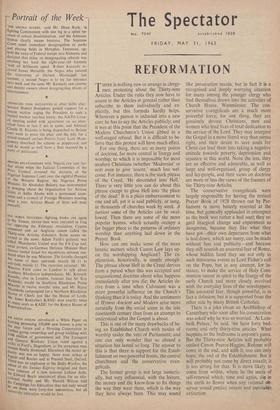REFORMATION
HERE is nothing new or strange in clergy- .' men protesting about the Thirty-nine Articles. Under the rules they now have to assent to the Articles in general rather than subscribe to them individually and ex- plicitly, but this formula hardly helps. Whenever a parson is inducted into a new cure he has to say the Articles publicly; and it was at this point that the President of the Modern Churchmen's Union jibbed in a well-staged refusal. But it is difficult to be- lieve that this protest will have much effect. For one thing, there are so many points of doctrine, far more central in liturgy and worship, to which it is impossible for most modern Christians (whether 'Modernist' or not) even to give `assent.' much less wel- come. For instance, there is the stark phrase of the Creed, 'He descended into Hell.' There is very little you can do about this phrase except to gloss Hell into 'the place of the dead.' It is a plain embarrassment to one and all, yet it is said publicly, or sung, in thousands of churches week by week. A fortiori some of the Articles can be swal- lowed. Then there are some of the more popular hymns, which actually occupy a far bigger place in the patterns of ordinary worship than anything laid down in the Prayer Book.
How can one make sense of the more lunatic matters which Canon Law lays up- on the worshipping Anglican? The ex- planation, historically, is simple enough. The phrase about Hell in the Creed derives from a period when this was accepted and unquestioned doctrine about what happens immediately after you die; the Articles de- rive from a time when Calvinism was a more powerful influence on the Church's thinking than it is today. And the sentiments of Hymns Ancient and Modern arise more naturally from the social scene in the late nineteenth century than from an attempt to understand what the Gospel is about.
This is one of the many drawbacks of be- ing an Established Church with modes of worship under the veto of Parliament; and one can only wonder that so absurd a situation has lasted so long. The answer to this is that there is support for the Estab- lishment on two powerful fronts, the central churchmen and the conservative evan- gelicals.
The former group is not large numeric- ally, but very influential, with the leisure, the money and the know-how to fix things the way they want them, which is the way they have always been. This may sound like persecution mania, but in fact it is a recognised and deeply worrying situation for many among the younger clergy who find themselves drawn into the activities of Church House, Westminster. The con- servative evangelicals are a much more powerful force; for one thing, they are genuinely devout Christians, men and women who lead lives of total dedication to the service of the Lord. They may interpret the Gospel in a more literal way than seems right, and their desire to save souls for Christ can lead them into taking a negative attitude towards poverty, deprivation and injustice in this world. None the less, they are an effective and admirable, as well as large and well-organised, group of clergy and lay-people, and their views on doctrine are more or less the views of the framers of the Thirty-nine Articles The conservative evangelicals were largely responsible for having the revised Prayer Book of 1928 thrown out by Par- liament (a move bitterly resented at the time, but generally applauded in retrospect as the book was rather a bad one); they re- gard liturgical change and experiment as dangerous, because they like what they have got—their own departures from what is laid down, which are many, can be made without fuss and publicity—and because they still nourish an ancestral fear of Rome, whose hidden hand they see not only in such innocuous events as Lord Fisher's call on the Pope, but in any attempt, for in- stance, to make the service of Holy Com- munion nearer in spirit to the liturgy of the early Church and more closely involved with the everyday lives of the worshippers. This ancestral fear, though powerful, is in fact a delusion; but it is supported from the other side by many British Catholics.
There is a joke about an Archbishop of Canterbury who soon after his consecration was asked why he was so worried. 'At Lam- beth Palace,' he said, 'we have forty bed- rooms and only thirty-nine articles.' What happens to the bedrooms is anyone's guess. But the Thirty-nine Articles will probably outlast Canon Pearce-Higgins. Reform will come in the end, and with it, one can only hope, the end of the Establishment. But it will probably not come by direct assault; it is too strong for that. It is more likely to come from within, where lie the seeds of self-renewal which, time and again, die in the earth to flower when any, rational ob- server would predict instant and inevitabit extinction.


































 Previous page
Previous page